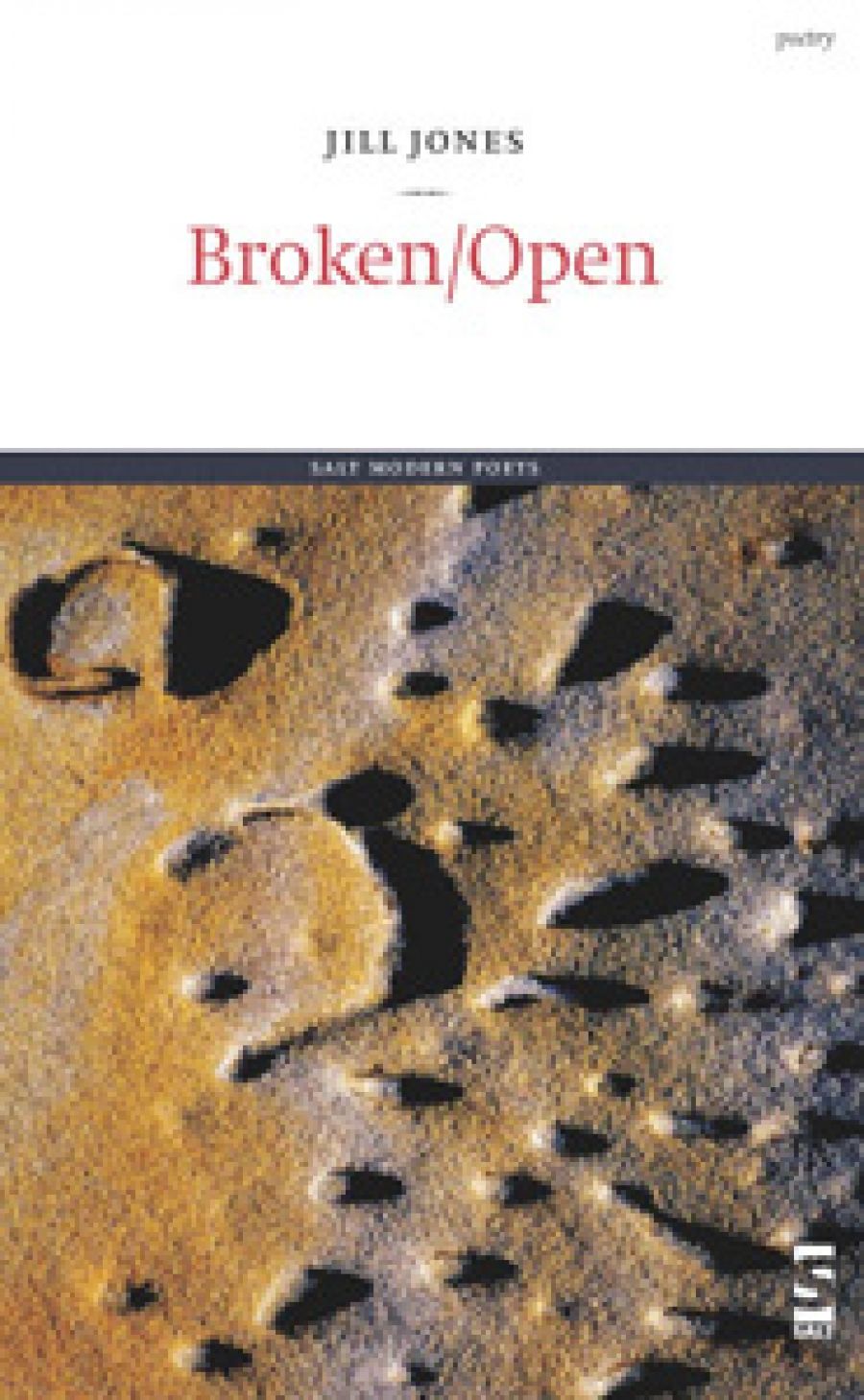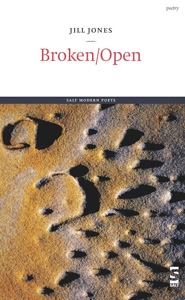
- Free Article: No
- Contents Category: Poetry
- Review Article: Yes
- Article Title: Yearning asides
- Online Only: No
- Custom Highlight Text:
Broken/Open, Jill Jones’s fifth book of poems, explores the meanings of breaking and opening partly through an exploration of memories where the past is more accessible than the unexpected shocks of the present. Jones’s previous book, Screens Jets Heaven: New and Selected Poems (winner of the 2003 Kenneth Slessor Poetry Prize), contained many poems that hinted at abstraction. Broken/Open, divided into eight sections, furthers that abstraction. Journeying through sites of childhood and memory, the book’s forays into the past open out the present, particularly in the last epiphanic section. Unlike in some earlier work, where social and political comment were overt, opinions are often relegated to phrases to make context for the main drama, although one poem mirrors the plight of asylum seekers with its rudimentary finish: ‘Because I don’t belong here – being from the State of Flux – my / papers do not rhyme … // Because I don’t belong here, I know it is better and I know it is / worse’ (‘Refrains on Sand’).
- Book 1 Title: Broken/Open
- Book 1 Biblio: Salt, $29.95 pb, 147 pp
- Book 1 Cover Small (400 x 600):

- Book 1 Cover (800 x 1200):

The events of September 11 also break open through this work – ‘God bless the veil / of dust.’ (‘Displacements’) – with ‘Armageddon’ appearing several times. A flurry of sensations and unfinished lines seems to mimic this tumult, mocking the possibility of completion, while other poems conclude almost too neatly in a roundelay of assonance, where melody replaces meaning. Some of Jones’s more formal experiments are the most successful, such as ‘Sun Before the Long Wait’, where each stanza uses the same end words:
this is welcome – suspended where houses listen
trace the broken fence, timing winter out
the grapple I can’t heft, rhyme or weight …fears that can’t approve or anxieties listen
time toughs the excuses out
having been released from the long wait.
Other formal experiments include the montage ‘30scapes’, which takes its lines from poems in a local anthology, while, less successfully, ‘The Far from Home Retro Mix’ incorporates lines from pop songs. Jones’s language moves between discontinuous yet yearning asides and statements often resistant to interpretation to swirls of description. Some of the best poems are those that comment on a world outside a Rilkean self, such as ‘On and OffScreen’: ‘Amnesia behind his eyes, a president / promises more of the future. Entertainment. / All the same, like another disaster.’
Shelley is invoked in ‘Liberty Changes’, which promotes a hopeful revolution –
’readiness / instead of a wall’ – while the sequence ‘Struggle and Radiance’ is a reminder of Wordsworth’s ‘Resolution and Independence’. Some lines beg unintended readings, but more often Jones – at times a little like the American poet Susan Howe – is acutely aware of the slipperiness of language, of the impossibility of denoting meaning, of putting into words. But doubts make unhelpful guides, and some lyrical, less doubting poems are the tightest.
‘Temporal’, which begins the fifth section, ‘Shards’, affirms commitment to writing, and many poems track development towards poetic and personal enlightenment: ‘bold and alone, my feverish sympathy / fits my flame to a dialect, foreshadowing pain.’ The masculine tradition in art is also dryly considered: ‘Already on the curriculum / young man with a camera / later to reassess the cluster of names / necessary precursors – semen as wisdom’ (‘Influences’). Some love poems, especially the sequence ‘Limits We’ve Shouldered’, carry the journey towards ‘openness’, while ‘Hidden Shrines’ and ‘Scented Even in Sleep’, from the final section ‘ecstasy on a verandah’, move from elegy to affirmations of ‘life’, the book’s final word: ‘I reached the end of the pier but couldn’t talk my way out of / Life … / I haven’t made a pretty picture for a long time but I may … / The pages colour with the various, speaking skin of it, life.’ (‘Life in Autumn’)
There are cross-fertilisations throughout Broken/Open, with certain lines or words appearing regularly. The birds of the first section echo the birds – which are also poems – in the last section. But poetry is also ‘skin’ in a constant metaphor: ‘reading skin, this old book of mine, this new’ (‘Life in Autumn’). In her earlier work, Jones has repeated a line, usually the first and last, to frame a poem for comic or polemical purpose, in Broken/Open words repeat within a poem: for example, the recurring ‘nothingness’ and ‘nothing’ in ‘Temporal’. Repeated words – night, rain, morning, flecked, flaky, blue, doubt – may implant cohesion but can also sound loose and garrulous.
Broken/Open is a little exhausted by its length, and some slight poems such as ‘A Door’ and ‘Air Poetry’ could have been omitted. Non sequiturs that oscillate between comedy and criticism create obscurity as in ‘The Mini Series’ – ‘Dads play with old train sets – / “it wouldn’t kill you to be nice.” … / I cannot accept that / the dollar is steady’, as does much description that mixes the concrete and the metaphoric, but this confusing of tone is partly Jones’s intention, sketching a broken world through sometimes cryptic, sometimes jubilant annotations: ‘And all around the world went off, banners and avenues, cruelties // Now it’s come one, come all, a kind of sassy hoedown // The grass is going, it cracks and withers sadly, almost infinitely’ (‘Grass’). Interspersed are poems written in response to paintings, some prose poems and an occasional dramatic monologue.


Comments powered by CComment